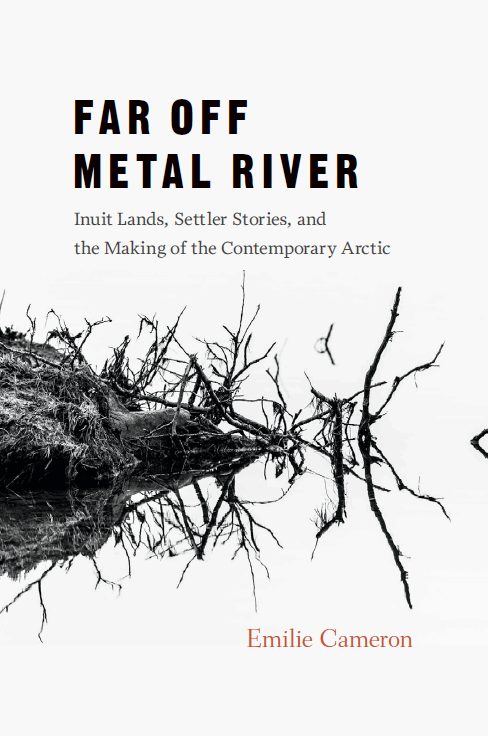Please join the Department of Geography and Environmental Studies at Carleton University as we celebrate the launch of a new book by Dr. Emilie Cameron.
Far Off Metal River: Inuit Lands, Settler Stories, and the Making of the Contemporary Arctic
Friday, January 22, 2016
2:30pm – 4pm
Room 252, MacOdrum Library
Carleton Univerity
This event will include a panel discussion with:
Dr. Emilie Cameron (Assistant Professor, Department of Geography and Environmental Studies, Carleton University)
Dr. Frances Abele (Professor, School of Public Policy and Administration, Carleton University)
Dr. Danielle DiNovelli-Lang (Assistant Professor, Department of Sociology and Anthropology, Carleton University)
Refreshments will be served.
Far Off Metal River is about how stories make worlds. It traces the imaginative, material, and political life of a particular story – the Bloody Falls massacre story, first told in the late 18th century – in order to better understand colonial and capitalist relations in the contemporary Arctic. Drawing on extensive ethnographic and archival research in Nunavut over the past decade, Emilie Cameron considers the ways in which this story has shaped the relationship of Qablunaat (an Inuktitut term for non-Inuit, non-Indigenous peoples or settlers) to northern lands and peoples. Although it is conventionally told as a story of Inuit-Dene violence witnessed by a neutral and horrified European explorer (Samuel Hearne), Cameron argues that the massacre story is, in fact, a Qablunaaq story, one that has made specific forms of violence, dispossession, and domination in the Arctic sensible, legible, and possible. She traces its role in the formation of late eighteenth century understandings of race and nature, its role in the production of scientific, geological, and anthropological knowledge about the North and about Inuit, its interweaving with mineral exploration and extraction activity, and various efforts to resist, ignore, and forget the story. Taken together, Cameron argues, these geographies of the massacre story help to both place and displace colonial relations in the Arctic, and suggest new forms of relation that Qablunaat might take up at a time of immense change in the region.
For more information, see UBC Press: http://www.ubcpress.ubc.ca/search/title_book.asp?BookID=299174732
About the Author
Dr. Emilie Cameron is an Assistant Professor in the Department of Geography and Environmental Studies at Carleton University. Her primary research interest is in critical northern geographies. Most recently, she has been focusing on mineral exploration and mine development in the Canadian Arctic, examining how mining interweaves with comprehensive land claim agreements, environmental assessment institutions, self-determination movements, and histories of colonial knowledge production. Working with partners at the University of British Columbia and Memorial University, Dr. Cameron is also part of a larger research project examining the ways in which industrial mineral economies have transformed social, environmental, economic, and cultural geographies in the Canadian North.
Commentary on the Book
“A brilliant and unsettling meditation on our relation to northern lands and peoples. Far Off Metal River teaches us to be responsible to the origins and purposes of our stories, to acknowledge their limits, and to see the North as full of stories that are not ours to know. A “must-read” in the face of renewed Canadian claims to Inuit lands and resources.” -Bruce Braun, author of Intemperate Rainforest: Nature, Culture, and Power on Canada’s West Coast
“In this engrossing and morally spirited book, Emilie Cameron examines Indigenous and newcomer understandings of the Canadian North through narratives of cultural exchange and colonial violence and their material consequences. Alert to how colonial stories about the Arctic maintain an insidious grip on the present, and why we ignore them at our peril, Far Off Metal River is a remarkable and ultimately hopeful work that will inspire debate at a variety of postcolonial sites about the complex links between place, power, memory, storytelling, and affect.” -Daniel Clayton, author of Islands of Truth: The Imperial Fashioning of Vancouver Island
